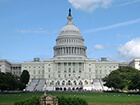
On May 20, 2015, the US House of Representatives passed two bills that carry troubling implications for the National Science Foundation (NSF): the America COMPETES Reauthorization Act of 2015 (H.R. 1806) and the Commerce, Justice, Science, and Related Agencies Appropriations Act, 2016 (H.R. 2578).
America COMPETES is the authorizing legislation for NSF, the National Institute of Standards and Technology, and several Department of Energy research programs. The main goal of the legislation is to invest in scientific research and innovation. The bill passed by the US House of Representatives includes steep reductions in NSF’s Directorate for Social, Behavioral, and Economic Sciences (SBE) and includes other provisions of deep concern. There was significant opposition to the bill by the scientific community. It is anticipated that the US Senate will not focus on the legislation until late summer or early fall.
Although the Commerce, Justice, Science, and Related Agencies Appropriations Act, 2016, includes a $50 million funding increase for NSF, it also includes troubling report language. As noted by the Coalition for National Science Funding (CNSF) of which ARL is a member:
The report language accompanying the bill requires NSF to dedicate 70 percent of its funding to four research directorates, and keep other offices (the Office of International Science and Engineering; Integrative Activities; and the US Arctic Commission) at their current FY 2015 funding levels. Unfortunately, this will force NSF to cut over $250 million, 16 percent of the combined budget, from the remaining two research directorates: Geosciences and the Social, Behavioral, and Economic Sciences. Such cuts would have a devastating impact on the disciplinary and interdisciplinary research supported by these directorates, impacting research as diverse as disaster prediction and recovery, prediction of extreme weather events, weak links in cybersecurity, children’s learning, and big data.
In response to this language, the White House issued a Statement of Administration Policy with a recommendation that President Obama veto H.R. 2578. The Senate is expected to take up the bill in early June.


